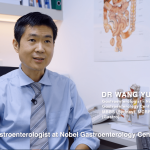World Osteoporosis Day: What is it & How Do I Know if I Have it?
Happy World Osteoporosis Day!
As we age, we can start to lose bone density, which can lead to osteoporosis. Learn more about Osteoporosis and some of its early signs with Dr Leon Foo, our Consultant Orthopaedic Surgeon from Island Orthopaedics (a member of Healthway Medical) in this video!
Transcript
0:04
Hello, my name’s Dr. Leon Foo. I’m from Island Orthopedics, and in this video I’ll be talking about osteoporosis.
What is osteoporosis?
0:11
So osteoporosis is a medical term describing the process in which bones weaken and they weaken to such an extent that they’re easy to break. So, bone is actually living tissue so even as we speak right now, bone is being formed and destroyed at the same. And osteoporosis occurs when there’s a net destruction of this bone.
Now, the main concern with osteoporosis is what we call fragility fractures, and they typically involve the hips, the shoulders, the spine, and the wrists.
What is the common age range that one is likely to develop osteoporosis?
0:44
While the vast majority of the patients with osteoporosis are the elderly age group, there is a subset of patients who are young, so you have them in their 20s and 30s, even the 40s. In these patients, the osteoporosis is often due to a secondary cause. That means there’s another underlying medical problem and the problems can be quite varied.
How quickly does osteoporosis progress?
1:08
So generally, osteoporosis progresses very slowly over many, many. But for the subgroup of secondary osteoporosis – osteoporosis due to underlying medical conditions, that’s highly variable though. Some of them can be quite slow and they can take many years to develop and others can be quite fast, in matter months, especially those that are medication related.
What are some of the symptoms and the early warning signs of osteoporosis?
1:32
Well, osteoporosis is actually also known as the silent disease, and it’s called the silent disease simply because patients don’t have any symptoms, so there’s no pain, you have good function, you will know you have osteoporosis, and often you don’t even suspect you have osteoporosis. But having said that, there are certain risk factors that can alert you, and if you have them, then you should see a medical professional for at least an assessment or follow-up to make sure you don’t have early onset osteoporosis.
Can osteoporosis be prevented?
2:05
Yes, osteoporosis definitely can be prevented. In fact, in this day and age, we are looking more and more at preventive health. So the old adage that prevention is better than cure holds particularly true for osteoporosis. So with osteoporosis, in particular for young ladies, it’s important that they build up their peak bone mass.
The analogy I often give to patients is like saving for retirement. So if you want a comfortable retirement, you have to work hard in the early years. Same with osteoporosis prevention, that is. You need to work hard in the early years to build up your peak bone mass by watching the four key ingredients – calcium intake, vitamin D intake, adequate sunlight and adequate weight bearing exercise.
2:50
So if you feel that you may have osteoporosis or are concern that you may have osteoporosis, please feel free to approach any of our specialists at Island Orthopaedics. Thank you

Dr Leon Foo
Consultant Orthopaedic Surgeon
Island Orthopaedics
Our Specialist
Dr Leon Foo is an Consultant Orthopaedic Surgeon at Island Orthopaedics. His clinical expertise is often called upon in the treatment of hip, knee, foot, ankle and shoulder problems arising from a variety of causes, be it degenerative (age-related), inflammatory, trauma or sports-related injuries. His surgical repertoire includes the latest technologies in cartilage resurfacing and regeneration, as well as joint replacement, including minimally invasive, arthroscopic, computer navigation, robotic and customized implants.









